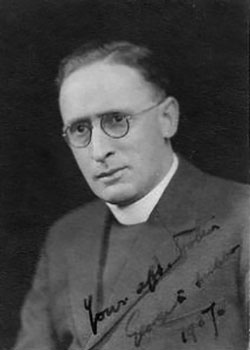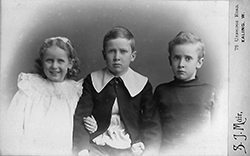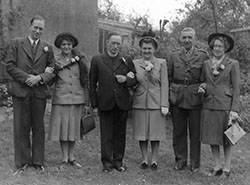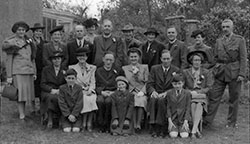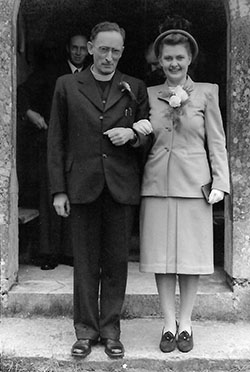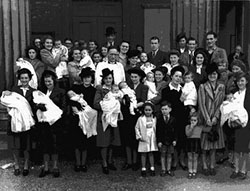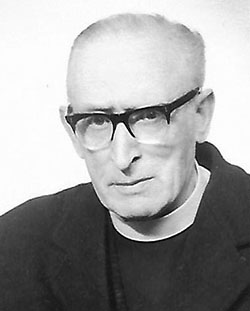The Rev. George Edward HUBBARD FRIBA 1897 - 1977
Third child, second son of Arthur John HUBBARD and Charlotte Marian VIZARD
Born 31st July 1897 at Hemel Hempstead
Died 3rd March 1977 at Northampton
Married Mollie Edith Buckett 5 October 1946 at Edmondsham, Dorset
Children:
1 Judith Frances Hubbard 20 January 1949
2 Robert John Hubbard 24 July 1952
3 Nicolas George Hubbard 5 December 1956
Life History
1915 George saw active service two weeks after his eighteenth birthday in the First World War, gaining the British War and Victory medals as an Army Corporal with the Royal Garrison Artillery. (319136) COTC = Commanding Officer, Training Contingent.
After WW1 George studied architecture in London and America. On his return to England, he joined the staff of the County Architect at the Shire Hall Gloucester, after which he was for five years chief assistant to a firm of architects in Trowbridge, Wiltshire.
1922 A.R.I.B.A. (Associate of the Royal Institute of British Architects)
1930 F.R.I.B.A. (Fellow of the Royal Institute of British Architects)
He then practiced in Lahore, which is now in Pakistan.
After a tour of missionary service as a layman in West Africa, George studied for ordination at Kings College London, together with gaining parish experience as a Lay Reader at St Stephen’s Church, Cinderford, Gloucestershire.
He was ordained deacon in March 1936, then priested that same year in December at Gloucester Cathedral. He was licenced as assistant curate to St James’ Church Gloucester.
From 1938 to 1944, George was principal of the Art Industrial School in Nazareth, Tinnevelly, South India with the S.P.G. He was also Diocesan Architect.
March 1944 George returned to England on furlough and appointed to the S.P.G. deputation staff.
September 1944 made priest in charge of Barton-upon-Humber, Lincolnshire.
December 1944 he was appointed as Rector of Littledean, his childhood home. He would have been somewhat rootless so a return to the village where he lived as a boy makes sense. He makes a visit to his old friends the Bucketts by then living in Edmondsham and choses ‘the prettier one’ – his words.
5 Oct 1946 Married Mollie Edith Buckett at Edmondsham, Dorset.
1947 Curate of St Luke’s West Norwood, in charge of St Paul’s.
Grandfather - W.R.Buckett visits Jan 12-15th 1948 “A short but most enjoyable visit.”
Judith born 20 January 1949
1949 The Hollies, Sandford, near. Bristol, Somerset.
The move must have been in July 1949, as someone called Doris was looking after me during the move from her entry in the Visitors’ Book.28/07/49 “I have enjoyed these moving times, especially the happy hours with Judith.”
1950 Vicar of Great and Little Oakley, Northamptonshire.
Mother's sister P.B.Buckett is the first visitor in July (3rd-7th) Very nice staying with you all again and seeing your new house + surroundings. Glad to revive memories of Kettering days. Judith is a little duck!
Robert born 24 July 1952.
Wilfred the cat came to us and somehow coped with all the moves. He was still with us at Milton Malsor. W.R.Buckett visits September 1953 and no hint of immanent removals.
1954 76 Westwood Road, Leek, Staffordshire
No entries in Visitors’ Book.
1954 – 55 Rector of Wickmere w Wolterton and Little Barningham. Norfolk.
Grandfather - W.R.Buckett visits 10th - 12th November 1954. “A short visit to Wickmere Rectory for the Institution and Induction of the Rev G.E.Hubbard to the United Benefice of Wickmere with Wolterton and Little Barningham. It was nice to see the new home of Mr. & Mrs. Hubbard. Judith is growing in stature and intelligence and is a sweet-tempered girl. Robert too has grown and is a sturdy bright boy. They will enjoy the freedom and roominess of this Rectory” Grand-dad.
October 1955
Newsletter of WICKMERE with WOLTERTON, and LITTLE BARNINGHAM
The Rev. G.E. Hubbard writes
It may come as a surprise for some of you to learn that, by the time this Magazine reaches you, Wickmere Rectory will once more be empty. Until the question of clergy housing is fairly and squarely dealt with by the Church authorities, there will be this coming and going of incumbents which is so prevalent today. After ten months as Rector of Wickmere, I just cannot stomach any longer this dreadful, worn-out, old house with its quarter-mile drive.
Apart from the very bad state of repair of the Rectory, it is all wrong for any parson to be so isolated from his parishioners [and parishioners from their rector], as is the case at Wickmere – to say nothing of being so remote from shops, school, bus routes and civilisation generally.
The garden too! – what a garden, two-and-a-half acres of it, nettles and other weeds everywhere, covering paths, lawns, flower beds, vegetable garden and orchards. Benefice income, though reasonable enough for moderate-sized property, is wholly inadequate to maintain this vast estate in the way it should be maintained. Everything was in a shocking state when we came here last autumn, but it is in far worse condition now.
Another aspect that has decided me to leave Wickmere at short notice and after being Rector for so short a time, is the present acute shortage of man-power in the Church. I consider that I should be frittering away the remaining useful years of my life were I to stay on indefinitely in Wickmere under existing conditions. Rather than waste my time, I have accepted the offer of work in a Liverpool slum parish [Christ Church, Bootle]. I shall be assistant curate to an elderly vicar who is a very sick man, badly crippled with arthritis, and in urgent need of help.
So at the end of this month [September] we shall be exchanging the bracing climate of Norfolk for the sights, sounds and smells of Merseyside; a tumble-down country rectory for a small, down-town terrace house; acres of weeds for a tiny backyard; wide stretches of unwanted glebe for the amenities of civilisation [with a Woolworths and a fried-fish shop just around the corner!] and mere existence for a worthwhile job. And, believe me, I know which I prefer!
Now, all too soon, the time has come for me to wish you all Good-bye. But here’s hoping that before long a small convenient rectory will be built in the centre of Wickmere [not miles outside it] for the mutual benefit of my successors and of the people of Wickmere themselves. Good-bye and good luck to you all.
G.E. HUBBARD.
Sept 1955 Bootle, near Liverpool. (3-4 weeks at the most) There is no mention of this in the Visitors’ Book.
1955 Curate of North Abingdon. Berkshire.
Nov.29th – 1st Dec 1955 “It was nice to see you all again in happy surroundings. Judith getting so grown up and Robbie so talkative – not forgetting soft, furry Wilfred. Thank you so much.” Phyl.
Nicolas born 5 December 1956
1957 Vicar of Kenton w. Ashfield and Thorpe.
From the visitors book: 22nd-25th Nov.1957 “We visited Kenton Vicarage to attend the service of Institution and Induction of the Rev G.E. Hubbard to the United Benefice of Kenton with Ashfield cum Thorpe. We hope that the family will be very happy here and that God’s blessing may rest on the work done in his Name.” Grand-dad and Auntie Phyl.
1958 Curate Halesowen w Hasbury (in charge of St Peter, Lapal) “Judith and Robert spent 12 days at Edmondsham and I accompanied them here to their new home on August 6th 1958 + stayed 2 nights. Glad to see the new house + surroundings and hope that you will all settle happily.” Auntie Phyl
1959 Rector of Milton Malsor, Northamptonshire. Rosemary Chapman, a friend of mine from Quinton came to stay 3rd-8th August 1959 so we would have moved possibly in the July after the school term; although my parents never took things like that into consideration in those days. Grand-dad and Auntie Phyl stay in August as well.
This was the longest stretch of time spent anywhere by the family. My education was already wrecked, and Robert had emotional difficulties. It was important for all our sakes to stay put. Mother was able to get part-time and substitute positions. The parish was easy – one church, one village. George was 62 and to have yet another move would have been too exhausting.
1966 Retired The Cottage, Blisworth, Northamptonshire
1967 37 St David’s Road, Northampton There was some other miniscule move which Nick remembers – but after a few days they returned to St David’s Road. I had left home by then.
1976 31 Ivy Road, Northampton
Written by Judith F Hubbard
Frances Ann Roper (née Hubbard) wrote of her brother
George was an extremely handsome child, with huge brown eyes, usually gleaming with wickedness, and a mop of dark gold curls which later deepened to brown. His looks were entirely belied by his temperament, for he can only be described as a perfect little devil, hot-tempered, turbulent and utterly unmanageable, his whole nature seemed to be in a permanent state of revolt against anything and everything. He took a fiendish delight in upsetting and annoying people, and when Jack and I were quietly playing together, he would rush in like a whirlwind and send everything flying, then dash off again before we could lay hands on him. All the storminess of his nature was vented on me, and he made my life a burden and misery with his tormenting. I have had my arms black and blue from elbow to shoulder with his pinches. He was utterly “contrary”, and always did the precise opposite of what we others were doing.
At the seaside he would refuse to come bathing with the nurse, Jack, and me, but as soon as we were dried and dressed again, and placidly eating our biscuits on the beach with Mother and Ben, George would walk off into the sea fully dressed and with his white linen hat on, and stroll about quite calmly in water up to his neck.
He never made any attempt with his lessons, and never passed a single exam at school. As far as we could make out, he spent most of his time at school in chasing the headmaster’s fowls, and great was his delight when one day an unfortunate hen dropped her egg in mid-air. According to George’s own account he caught it in his cap, and took it to the headmaster’s wife, oozing virtue from every pore, telling her he had found it, and was promptly rewarded for being a good little boy with a cake.
George had an absolute genius for acting the good little boy when it suited him. His great brown eyes, golden curls, and thin, handsome little face enabled him to get away with juvenile villainies which would never have been exonerated in a small boy of less appealing appearance. George’s policy was one of complete and exclusive non-cooperation, he would not even join in the games at school, and Jack has told me that on the football field George would always stand with hunched shoulders and sulky glower making not the slightest move to join in the games. When the ball was deliberately kicked to his feet, in the attempt to make him take part, he would merely look sulkier and more obstinate than ever and remain absolutely motionless. Nothing and nobody could get any co-operation out of George whatever, unless he chose.
He never joined in games with Jack and me but spent almost all his free time in building churches with a very large and comprehensive box of bricks that had been made by Uncle George. These buildings were really most remarkable for a small boy, and George would spend hours and days, and even weeks, on the same building. A special table had to be given up entirely to his buildings, for if ever one of us others dared to approach his precious churches, the resultant tornado of fury was so violent and alarming, that Mother saw to it that as little occasion as possible was given for an outburst. Even as a very small boy George was always drawing churches, and as he grew older, he would get photographs of famous cathedrals and reproduce them with his bricks in the most wonderful manner. It was not surprising that when the time came for to choose a career, it was architecture that he turned to. He became the most brilliant student of his year, and he who had never passed any exam in the whole of his previous life, came out top in every exam at the architectural college, and carried off prizes and diplomas wholesale. For several years he had a most promising career in architecture, and his powers of design were quite exceptional, but then he gave it up and took Holy Orders.
Judith writes of her father
I was the eldest child. People, who knew both father and I, often said that I definitely took after him both in personality and in ways.
When doing a personality test for career prospects a few years ago, I came out strongly as an architect. This pleased me greatly, except I was in my late 50’s and it was too late to take up that career. However, give me building blocks and I immediately build!
Father and I were close. We both had a rebellious streak and never took normal routes through life. We would both get up to pranks behind mother’s back. I remember a notable holiday at Heacham, in Norfolk around 1960. The game Bingo had just recently become popular and there was a Bingo centre near where we were staying. He and I went off several evenings on the pretext of a walk together but instead had a fun time doing Bingo! It was such an antithesis to our usual life, that it was totally therapeutic. We never said a word about ‘Bingo’ to anyone.
Father had a very sweet tooth; chocolates and sweets were a passion, which probably didn’t help the diabetes he developed in later life. I have to constantly keep in check, my own consumption. A box of chocolates could sit unopened on my shelves for a very long time, but once opened has to be consumed totally, straight away.
His approach to religion was highly personal and original, which meant he found the tedium of parish life crippling. This doesn’t mean father wasn’t a good and faithful priest – because he was. Just that his approach was different from the mainstream. His mother always wanted him to be ordained (like his brother Jack) and he eventually bowed to this. His vision of religion however was wider than most people’s. He could embrace and accept the other faiths he found in India with an openness that did not put him on the ‘convert the wretched heathen’ wagon. Instead, he enjoyed dialogue and valued friendship with those of other faiths in an age that was pre-multicultural/multifaith as we understand it.
Father had a love of ancient buildings which with his architectural skills, made him very acceptable to bishops! A parish priest who is also an architect was a valuable find.
Both my brothers had quite a different and not very easy relationships with father. Being younger than me, they rarely saw the more fun-loving side of him. Those few years made all the difference. Robert with his problems was a severe disappointment to father. By the time Nicolas came along, father had run out of steam for family pursuits. Nicolas in particular always felt he had a grandfather figure rather than a father figure to look to. Other fathers played cricket or kicked a football around – my brothers had little or none of this.
Father’s later years were not happy ones. His marriage with my mother had been fraught with difficulties since the mid-nineteen-fifties. There was a twenty-year difference between mother and father which never made things easy. These days they would have divorced, but being products of their upbringing, generation and being ‘clergy family,’ divorce was not an acceptable option. All credit to all of us, that we stayed as sane as we did.
He loved cats and teased them unmercifully, but they always came back purring for more! Nick my brother has the same gift – cats adore him, yet he can treat them in a very rough way.
Read more about George's life in his Indian Diary.
